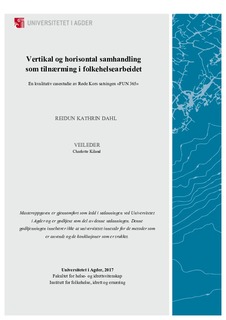| dc.description.abstract | Background and purpose: The theme of this study is collaboration as an approach in public
health. The study focuses on the experience of actors from various sectors and government
levels involved in a collaboration regarding complex public health issues such as child
poverty.
Method: The study is based on a qualitative design where a case study is used as a strategy of
research. The empirical basis is FUN 365, a measure initiated by the Red Cross. FUN 365 is a
child and family camp concept aimed at children and families affected by child poverty. The
method used for collecting data is mainly qualitative research interview, as well as document
analyses. A strategic selection of 18 informants has been conducted, which includes involved
actors from public and voluntary sector, as well as participants of FUN 365.
Results: The results in this study shows a mutual understanding among actors from public and
voluntarily sector of collaboration as an appropriate and important approach in public health
aimed at complex challenges, such as child poverty. Simultaneous, interaction between actors
from different sectors and government levels requires the existence of prime movers who
work continuously with collaboration, information and anchoring of the measure. Different
sectors represent different cultures, with their distinct working methods and systems. This
makes collaboration between them challenging. The actors also express that they possess
different knowledge of effective measures regarding child poverty. In addition, the municipal
actors experience that recruitment of participants to FUN 365 is challenging because child
poverty is characterized by a significant stigma. The families participating in FUN 365
describes an experiences of unity, inclusion and a sense of coping, and that they bring these
positive experiences back to their everyday life.
Conclusion: Vertical and horizontal collaboration are considered an important approach in
public health regarding child poverty. In this study, FUN 365 appears as an example of an
appropriate approach in efforts to counteract the consequences of growing up in poverty.
Keywords: Social inequality in health, child poverty, collaboration, voluntary sector, public
sector, public health, measures | nb_NO |

